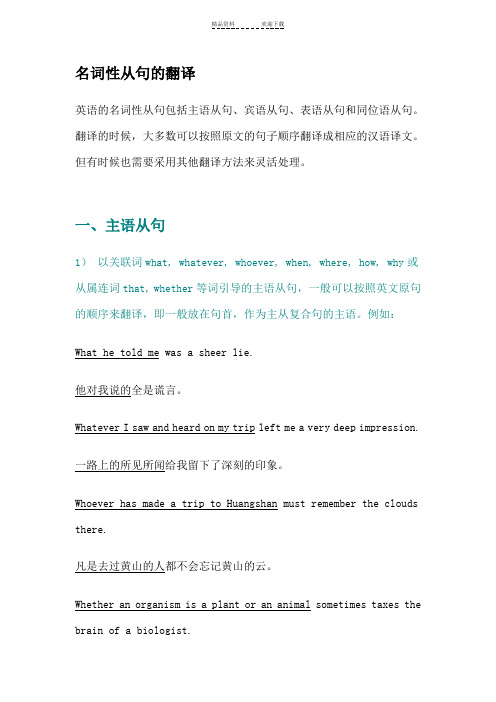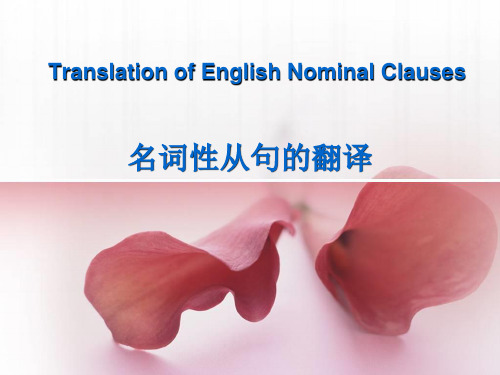Chapter14 名词性从句的译法
名词性从句的翻译

2) 以it作形式宾语的宾语从句 一般按原句顺序翻译,it可不译出
I
made it clear to them that they must hand in their papers before 10 o’clock in the morning. 我明确地告诉他们,论文必须在上午十点之 前交。 Anyhow, old chap, I owe it to you that I am here. 不管怎么说,老伙计,我现在还能站在这儿, 全靠你。
2) 译为类似定语的结构或独立句
But
I knew I couldn’t trust him. There was the possibility that he was a political swindler. 但我知道不能轻信他。他是政治骗子这 种可能性还是存在的。 It does not alter the fact that he is the man responsible for the delay. 迟延应由他负责,这个事实是改变不了 的。
同位语从句
保持原本的语序 译为类似定语的结构或独成一句 加入冒号、破折号和“这样”、
“这一”、“即”等字眼 改变原文的同位语结构,用汉语 的无主句或其他方式译出
1) 保持原本的语序
He
expressed the hope that he would come over to visit China again. 他表示希望能再来中国访问。 As an obedient son, he had accepted his father’s decision that he was to be a doctor, though the prospect didn’t interest him at all. 作为一个孝顺儿子,他接受了父亲的决 定,去当医生,虽然他对这样的前途毫 无兴趣可言。
翻译培训 名词性从句的译法

宾语从句的译法
在把宾语从句译成汉语时,通常按 照句子的语序翻译即可。
有时也视具体情况对原文语序进行 调整。
例:
They proposed that we take certain precautions.
It +谓语+that从句
通常按原文句子结构顺序翻译,It 不 译出来。
例:
It seems that she is going to buy a car on installment.
她好像要用分期付款的方式购买汽车。
It goes without saying that plants cannot grow without sunlight. 不言而喻,没有阳光,植物就不能生长。
Enthusiasm means that your are stimaulated by your work, and are able to find new challenges and keep growing professionally. But most jobs have some elements that are less fun and more difficult to carry out. This is where passion really comes into play. When you love that you do, it isn’t too difficult to get the job done. The hard part is performing equally well in those less interesting tasks.
名词从句的译法

名词从句的译法一、主语从句(一)、以what, whatever, whoever等代词引导的主语从句翻译时一般可按原文顺序翻译(二)、以it作形式主语所引出的真主语,翻译时视情况可以提前,也可以不提前。
二、宾语从句(一)、以what, whatever, whoever等代词引导的主语从句翻译时一般可按原文顺序翻译(二)、以it作形式主语所引出的真主语,翻译时视情况可以提前,也可以不提前。
三、表语从句四、同位语从句(一)、同位语从句汉译时不提前(二)、同位语从句提前(三)、增加“即”(或“以为”)或用冒号、破折号分开五、用单词、短语作同位语的译法。
(一)、说明身份、称号的英语同位语往往被放在专有名词面,汉译时一般放在前面。
(二)、限制性同位语以及用形容词、数词等作进一步说明的同位语在英语中往往放在本位语后面,汉译时一般无需改变位置。
(三)、原文中有些同位语,汉译时往往需要做适当扩充或加破折号、冒号等。
名词从句的译法一、主语从句(一)、以what, whatever, whoever等代词引导的主语从句翻译时一般可按原文顺序翻译What he told me was only half-truth.他告诉我的只是半真半假的东西而已。
Whatever he saw and heard on his trip gave him a very deep impression.他此行的所见所闻都给他留下了深刻的印象。
Whoever has made a voyage up the Hudson must remember the Kaatskill Mountains.凡是在哈德孙河上游航行过的人是一定记得卡兹吉尔群山的。
Whether we did or didn’t choose to carry them was up to us.我们是否要带着些东西,由我们自己决定。
(二)、以it作形式主语所引出的真主语,翻译时视情况可以提前,也可以不提前。
Chapter名词性从句的翻译

一般可转译为由主谓词组,偏正词组充当的 主语或宾语。 以what, whatever, whoever等代词引导的主 语从句一般可按原文顺序翻译。
宾语从句的翻译
可转译为由主谓词组充当的宾语﹑定语,由 偏正词组充当的宾语﹑主语或转译为由动宾 词组充当的宾语。
表语从句的翻译
练习答案
1.It is reported that the meeting will be held in June. 据报道,会议将在六月召开。 2. I also told him how appealing I found the offer. 我也告诉他,这提供的机会对我有多么大的吸引力 3. Nowadays consumers become more and more practical and buy only what they need. 现在消费者越来越实际,他们只去购买他们需要的东西。 4.“Sustainable development” is a question that we can continue developing the world without damaging the environment. 可持续发展就是,在不破坏环境的情况下我们能继续发展。 5.It is recommended that the project will not be started until all the preparations have been made. 有人建议,做好了所有的准备工作再开始这个计划。
Hale Waihona Puke 6.They received orders that the work be finished by the end of this month. 他们收到命令,工作必须在这个月底完成。 7.We believe that the crux of the problem lies in the enforcement of the nation's anti-pollution laws. 我们知道这个问题的关键在于加强国家反污染条 例的实施。 8.Human resources (HR) consultancies predict that within the next two years, about a quarter of the managers working for multinationals in China will be Chinese returnees with experience in developed foreign markets. 人力资源咨询公司预测,未来两年,在中国的跨 国公司中,大约四分之一的经理都会有在发达国 家海外市场工作的经验。
名词性从句的翻译

名词性从句的翻译英语的名词性从句包括主语从句、宾语从句、表语从句和同位语从句。
翻译的时候,大多数可以按照原文的句子顺序翻译成相应的汉语译文。
但有时候也需要采用其他翻译方法来灵活处理。
一、主语从句1)以关联词what, whatever, whoever, when, where, how, why或从属连词that, whether等词引导的主语从句,一般可以按照英文原句的顺序来翻译,即一般放在句首,作为主从复合句的主语。
例如:What he told me was a sheer lie.他对我说的全是谎言。
Whatever I saw and heard on my trip left me a very deep impression.一路上的所见所闻给我留下了深刻的印象。
Whoever has made a trip to Huangshan must remember the clouds there.凡是去过黄山的人都不会忘记黄山的云。
Whether an organism is a plant or an animal sometimes taxes the brain of a biologist.一种生物究竟是植物还是动物,有时会让生物学家颇伤脑筋。
2) 对于it作形式主语的主语从句,可以先译主句,顺译为无人称句。
有时也可先译从句,再译主句,这样的话,一般需要在主句前加译“这”。
需要注意的是,如果强调it,可以将其译出;如果不需要强调,也可不译。
例如:It is strange that she should have failed to see her own shortcomings.真奇怪,她竟然看不出自己的缺点。
It seemed incredible that she should have lied to us.她居然对我们说谎,这真是不可思议。
It doesn’t make much difference to me whether you come or not.你来不来我不在乎。
新英汉翻译教程 第十四章语态转换译法答案

【译文】我沿着田 野、树篱的边缘, 走过小径,一直走 到日上三竿。我觉 得今天是个美好的 夏日的早晨。我知 道,我出门时刚穿 上的鞋子,很快就 让露水打湿了。可 是,我不看升起的 太阳,不看湛蓝美 好的天空,也不看 正在苏醒的大地。
18
返回章重点 退出
He who is taken out to pass through a fair scene to the scaffold, thinks not of the flowers that smile on his road, but of the block and axe-edge; of the disseverment of bone and vein; of the grave gaping at the end; ...(Charlotte Bronte: Jane Eyre)
【译文】我们的衣服给汗水湿透了。
13
返回章重点 退出
例2:The crops were washed away by the flood.
【译文】庄稼给大水冲跑了。
例3:Your car was towed away by a towing truck from Lewis Company.
【译文】路易斯公司的一辆拖车把你的汽车给 拖走了。
【译文】 维生素C受热过度就会被破坏。
例2:Once the flower has been pollinated and fertilized, the plant provides the newly formed seeds with a reserve of food materials, which will be needed when they themselves germinate.
名词性从句的转换掌握名词性从句的转换方法

名词性从句的转换掌握名词性从句的转换方法名词性从句在英语语法中占据着重要的地位。
它们可以起到名词的作用,可以用来作主语、宾语、表语和同位语。
掌握名词性从句的转换方法对于提高英语的表达能力至关重要。
本文将介绍一些常见的名词性从句的转换方法。
1. 转换主语从句:名词性从句作为主语时,可以将从句转换为it作为形式主语,而将原来的主句动词移到句末。
例如:原句:That he won the competition surprised everyone.转换后:It surprised everyone that he won the competition.2. 转换宾语从句:名词性从句作为宾语时,可以将从句转换为动词不定式或动名词的形式。
例如:原句:I know that he is busy.转换后:I know him to be busy.或:I know about his being busy.3. 转换表语从句:名词性从句作为表语时,可以将从句转换为形容词或介词短语。
例如:原句:The important thing is that we try our best.转换后:The important thing is to try our best.或:The important thing is trying our best.4. 转换同位语从句:名词性从句作为同位语时,可以将从句转换为独立成分。
例如:原句:Her hope is that she can go abroad for further study.转换后:Her hope, to go abroad for further study, is strong.5. 特殊转换方法:在一些特殊情况下,名词性从句可以转换为介词短语或动名词的形式。
例如:原句:I have no idea what she is talking about.转换后:I have no idea about what she is talking.总结起来,掌握名词性从句的转换方法可以使语言表达更加灵活多样。
名词性从句的译法

例4:Whatever he saw and heard on his trip gave him a very deep impression. 【译文】他此行所见所闻都给他留下了深刻的印象。 例5:Since hearing her predicament, I’ve always arranged to meet people where they or I can be reached in case of delay. 【译文】听她说了那次尴尬的经历之后,每每与人约 见,我总要安排在彼此能够互相联系的上的地 方,以免误约。
and talk the matter over with him.(it作形式宾
语)
【译文】我理所当然地认为,你会来跟他谈这件事
的。
例3:Another cause of obscurity is that the writer is himself not quite sure of his meaning. (表语从句) 【译文】写不清楚还有一个原因,那就是作者自 己对于所要表达的意思也不是很有把握。
补充例句:名词性从句 例6.We can explain very simply the important differences between solids, liquids, and gases on the basis of the theory that matter is made up of particles, and that these particles can move more easily in some states of matter than in others. (同位语
这些从句的翻译一般按原句的语序处理这些从句的翻译一般按原句的语序处理即可相对比较容易但有时也可以译即可相对比较容易但有时也可以译为并列分句定语从句或其它形式的句为并列分句定语从句或其它形式的句如果名词性从句包含两层以上的意思需要把主句与从句分开译
- 1、下载文档前请自行甄别文档内容的完整性,平台不提供额外的编辑、内容补充、找答案等附加服务。
- 2、"仅部分预览"的文档,不可在线预览部分如存在完整性等问题,可反馈申请退款(可完整预览的文档不适用该条件!)。
- 3、如文档侵犯您的权益,请联系客服反馈,我们会尽快为您处理(人工客服工作时间:9:00-18:30)。
(二) 表语从句 顺译法:先译主句 后译从句 Energy is what makes things work and it can be changed into heat or light or used to drive machinery.
3 译成动宾词组的宾语 A motor is not much different from a generator except that their energy origins are not the same.
除了能源不同外,电动机与发电机没有多大 不同
3 转译为句中的主谓词组
当同位语所说明的本位语是含有动词意义的 词 例如:discovery, hope, suggestion, assurance, knowledge 将其转译成动词 将同 位语从句译成动词的宾语. He expressed the hope that he would do the experiment again. 他表达了他要再做一次实验的愿望(定语)
物体在水中沉浮取决于其密度。
Where we shall go for practice has not been decided. 我们去何处实习尚未决定。
2 即使主语很长,或有几个主语从句并列,也 可以用 先述后提法 将之译成汉语的主语。 How energy and matter behave, how they interact one with the other , and how we control them to serve the people make up the substance of two basic physical science— physics and chemistry. 能和物质如何起作用,它们如何相互影响, 我们如何控制使它为人服务,这些问题构成 了两门基础自然科学—物理学和化学的内容。
能就是能使物体做功的东西,他还能转变成 为热和光来驱动机械。 Water is what all living things need.
水是一切生命之需要。
(三) 宾语从句 译成汉语中的宾语 Automatic machines can only do what they have been told to do. 自动化机器只能做人们要求做的那些事。 Every one realizes to what extent the world is dependent on petroleum. 大家都知道(当今)世界对石油的依赖到 了何种程度。
第一节 主从复合句的译法
一 定语从句的翻译
二 状语从句的翻译
三 名词性从句的翻译
三、名词性从句的翻译 (1) 主语从句 (2) 表语从句 (3) 宾语从句
(4) 同位语从句
(5) 介词宾语从句
汉语中没有与之相对应的分句,
所以要转译。
(一) 主语从句 1 主语从句引导的是主语,可译为汉语中的 主语 ( 只要不是很长) Whether an object will sink or float on water depends on its density.
他表达了他的愿望,即再做一次实验。 (后续分句)
他希望他能再做一次实验。
4 译成独立单句 The operation is adaptive in the sense that the tap-gain-adjustment information is derived from the received data.
(四) 同位语从句 1 译成汉语的后续式分句
In 1905 Einstein worked out a theory that matter and energy were not completely different things.
1905 年爱因斯坦研究出一套理论,即 物质与能相关论。
2 译成句中的定语 The fact that electric currents passing through a wire produce heat is known to all. 电流通过导线产生热的这一事实是众所周 知。 These uses are based on the fact that silicon is a semiconductor of electricity. 这些用途是基于硅是电的半导体的这一事 实。
2 译成主谓词组或动宾词组 The first lesson is about how light travels. 第一课讲光怎样传播。
The kind of engine used depends on what fuel is easily obtained. 选用发动机的种类取决于哪一种燃料容易获 得。
抽头增益调节的信息是根据所接收的数据 推导出来的。从这个意思上说,整个过程 是自适应的。
(五) 介词的宾语从句 1 译成名词性词组 The ultimate disposal of these treated waste water is dependent on w的废水最终如何处置取决于他 们的决定。 Electric power can be easily transmitted from where it is generated to where it is needed. 电可以方便地从发电之处送到用电之地。
3 主语从句较长的时候,一般用it作形式主语, 可以顺译成无主语句。 It can be seen that precleaning alone would not reduce the total sulfur content of the four coals to levels anywhere near the standards.
